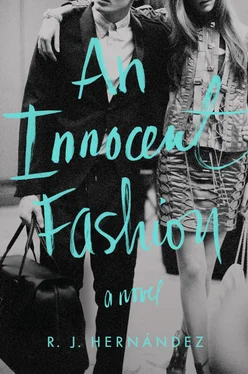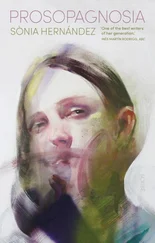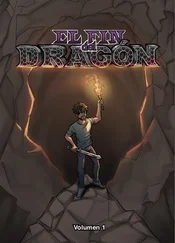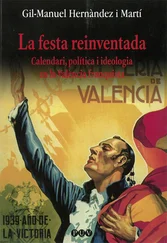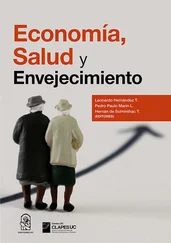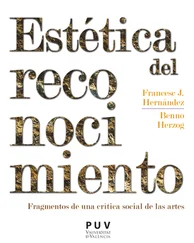Madeline was cross-eyed, with her chin tilted up like she was trying to balance an invisible spoon on her nose. “No cash,” she shrugged.
“Come on, Madeline, I’m not paying for this.” I elbowed Dorian—“Hey! Hey! ” I turned up his thigh to yank out his wallet from his back pocket. Squirming like a cat dangled over a bathtub, he remembered me and let me go ahead.
The rain felt colder the second time. Even though Dorian’s building had an awning that extended to the curbside, the two of them took so long to exit the cab that we were soaked anew by the time we reached the front door. It was a familiar door — ornamented wrought iron, in a Gilded Age style — and when it opened to a familiar foyer of mahogany wood bordering peach damask walls, it revealed Harry, the night porter, who was also familiar.
“Mr. St. James!” he exclaimed, fondly patting my wet back with a white-gloved hand. “I’d been wondering when you’d come around again.”
During college, excursions into New York City had often led to sleepovers at Dorian’s apartment, where compared to Madeline’s, parental supervision was appreciably scarce. On the rare nights his jet-setting mother was actually home, we usually found her in the last stages of a “spirit hour” involving Percocet and Veuve Clicquot, sashaying up and down the stairs to help her face mask dry, while Buddha Bar played over the surround-sound speakers, and Nag Champa poured out from a dozen incense burners. “Don’t mind me!” Edie would say, twirling a tassel on her charmeuse bathrobe. “I’m just cleansing.”
Now I buckled under Dorian’s weight while Madeline tried to lean her elbow on my back like a desk.
“Are you all right? Is that Mr. Belgraves?”
Madeline smirked. “ Hiiiii Haaaarrrryyyyyy. ”
“Welcome back, Miss Dupre.” He turned to me and asked, “Have you seen Mr. Belgraves’s modeling photos from Paris yet?”
I nodded with a sigh. “Can you buzz us up?”
Harry pressed the Up button on the elevator and held the door with a suited arm. “He’s looking very handsome these days, isn’t he?” He gestured with a proud chin toward Dorian, whose “handsome” knees were almost scraping the hardwood floor. “I always said that boy should be a model. Just like his mother.”
“Yes,” I agreed. “Yes, you did.”
EVERYBODY HAD BEEN SAYING THAT FOR A LONG TIME, THAT Dorian should be a model. That he ended up actually doing it wasn’t much of a surprise; the surprising part was how long he held out.
He’d go up to New York City for a ball or a gala or “ some thing with Karl ,” and be accosted by a scout or a modeling agent, and every time he came back, his voice would be tainted with a harsher streak of disdain. “ They think with everything I’m capable of, I’d agree to be dressed like a rag doll and propped up for pictures ,” he’d scowl. Meanwhile, the “everything” of which he imagined himself capable was known only to him. He loathed to be perceived as just a rich, pretty face, yet had failed to augment this perception with a lasting demonstration of noninherited merit. Madeline had been appeased by his rejection of modeling as a suitable pursuit: She hated the idea of her boyfriend with his shirt off, attracting millions of eyes that didn’t belong to her. Once or twice she’d attended events in New York City with him where she had witnessed the attempts. It was a joke between them: “ Three people begged Dorian to sign a contract last night ,” she’d laugh while holding onto his arm, proud that it was her who got to have him in the end.
Looking back, perhaps he knew all along, and was merely warming us up to the idea. More likely, though, he had been floating in an infinity pool in Crete when they e-mailed him with an umpteenth invitation to Paris. He probably stirred his gin and tonic with a swizzle stick and looked across the water, then, contemplating his fondness for the Champs-Élysées, thought, Why not? — in regard to modeling, and his entire life. It shouldn’t have come as a shock. For our trio, it had always been about the next exciting thing. We prided ourselves on intimate relations with the halfhearted cousin of true recklessness — elaborate plans culminating in afternoon naps in each other’s arms, talk of road trips and big parties and graduating and going off “ into the world ,” occasionally committing to some wild gesture: splashing stone-sober into the fountain at Sterling Library, or roaring down a highway sticking out of the moonroof of Blake’s car — the shape of change, an aesthetic.
There were plenty of drugs and alcohol to keep us feeling new and exciting, and when all else failed, we just looked around and remembered that we were surrounded by our beautiful friends, our beautiful, young life. Somehow though, it wasn’t enough for Dorian — or more likely, it was too much. He thought he had eluded a life Path, that dreaded bulwark of boredom and banality which in his mind equated to a life unjustly compromised, yet maybe. the dreaded Path was us , and he had unwittingly settled into us as complacently as a gray flannel suit into a seated position from nine to five. We couldn’t be sure. All we knew was that — he left. Just didn’t say a word to us, and was gone.
After a series of unanswered phone calls, a final call to Dorian’s mom’s house in Paris confirmed it: Dorian had left. To us, the reason remained a mystery.
Barely able to believe it, Madeline cried and cried. I was upset, too, but at first I refused to take it personally. Like a housewife who convinces herself that her absent beloved must be “working late” or “out to buy milk,” I made excuses for Dorian. He must have had some troubles we didn’t know about. His mother had just remarried for the second time, and I knew his relationship with his father wasn’t the best. Money and good looks weren’t everything, you know — surely something was bothering him, and he’d be back when he was ready.
Then Paris Fashion Week happened, and the whereabouts of the spectral spouse were finally known. For the first time since his disappearance, Dorian’s ghost appeared with a proverbial stumble onto our idyllic, shrub-laced porch, Windsor knot askew over his open shirt-front, and his head swirling like aerated wine. Intermingling with the faded notes of our own disgraced romance was the overpowering stench of the Other Woman’s cheap perfume: There is no love whose fragrance lasts forever.
Who knew if between us there had ever been any love at all?
When the splashy headline appeared in the Yale Daily News it was the end of September, which had been a month of intimate relations with Madeline’s tear-streaked face. “ MODEL STUDENT ,” the paper screamed in block letters, and all was explained with a picture of Dorian on the Jean Paul Gaultier runway. He appeared in pictures on the front page for the rest of the week, walking in a new show every day. Technically he wasn’t even a Yale student anymore — he had transferred to la Sorbonne, we later found out — yet his was the only news anybody at school was interested in. At Yale we were used to all the usual newsworthy stories: The pre-med major discovering an elusive cancer cell, or the Rhodes scholar publishing his debut novel. The most insufferable write-ups always happened after summer vacation, when all the do-gooders returned from the corners of Africa to pen op-ed articles about their acts of compassion in the third world, but Dorian’s news-making story was atypical and alluring.
By the third day, the well-worn grooves of campus talk were universally trampled by many have-you-heard? pairings of “Dorian Belgraves” and “Paris Fashion Week,” the latter term having never invaded undergraduate discussion before. Dorian was like an advancing army of one, whose image steadily laid greater claim to the defenseless pages of our school paper. Over dining-hall trays he had his makeup applied backstage, his foppish long hair clipped up with silver barrettes; on study-room desks, between notes on stem cells and the 1870 Franco-Prussian War, he attended Fashion Week after-parties with all the other gorgeous Impossibles who, we assumed, had run away from their own Yales everywhere. Soon there was not a person or a surface across the Yale campus that didn’t know Dorian Belgraves was having the best life of anyone we knew.
Читать дальше
